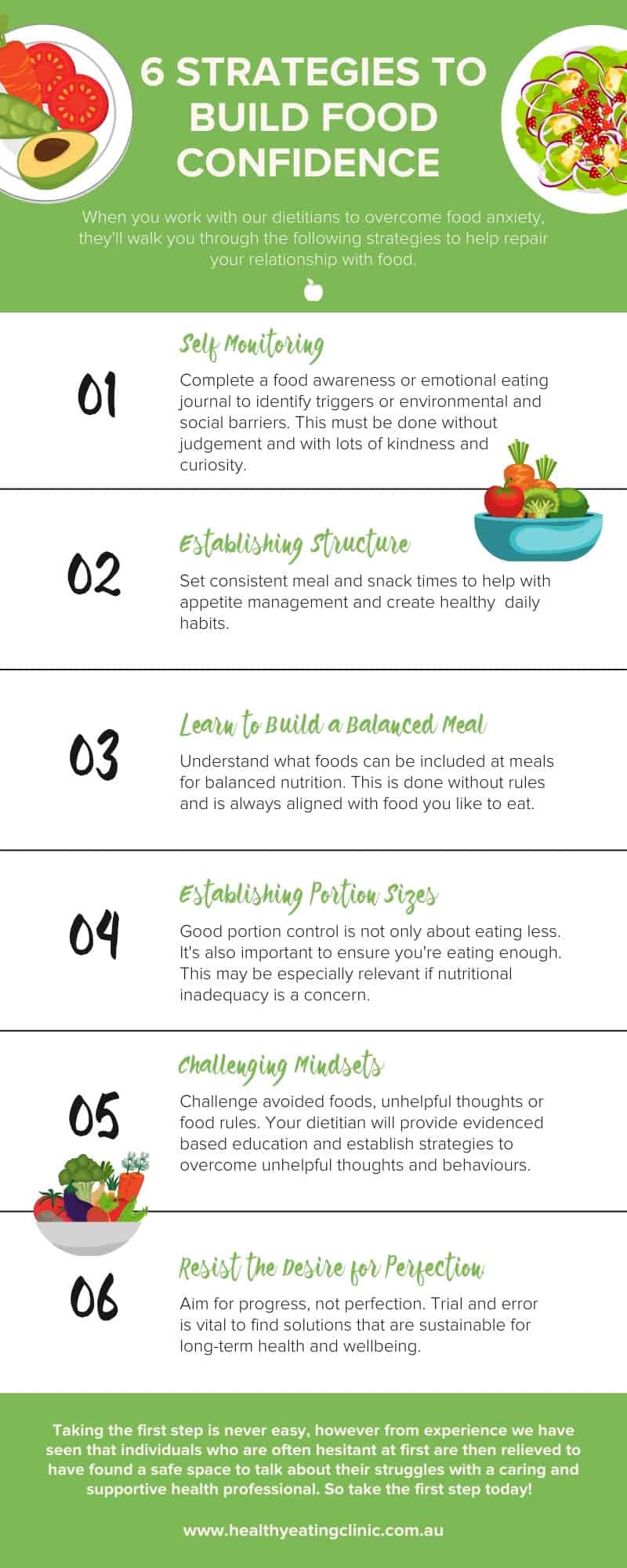
It is important to note that each person’s situation is different and that there is no one size fits all approach when it comes to treating food anxiety and disordered eating. However, if you have been struggling with this for some time and have considered seeing a dietitian, but are unsure as to how a dietitian could actually help, then this article intends to give you a better understanding of what to expect.
How can a dietitian help someone with disordered eating or food-related anxiety?
A dietitian is someone who is an accredited health professional who specialises in food, nutrition, and its relationship with our health. A dietitian specialising in the treatment of disordered eating provides counselling that addresses the physical and psychological factors of the individual. They work together to set goals and strategies, as well as provide education and guidance towards building a healthier relationship with food.
How does a dietitian work with a client to achieve this?
A dietitian’s role may vary depending on the severity of the disordered eating behaviours, age of the client as well as which other health professionals are involved as part of the treatment plan. With all clients, the dietitian needs to consider the individual’s key challenges including psychological issues and eating patterns in order to provide effective support to address the underlying issues. It is also the dietitian’s role to manage the risk of nutritional deficiencies and support the individual towards restoring good nutrition and normalised eating behaviours.
What to expect from a first consultation?
When you first meet a dietitian to discuss food anxiety or disordered eating behaviours, the main goal is to build rapport and trust. We understand that it can be a very personal and sensitive topic and so it is important you feel like it is a safe, non-judgemental space to explore and discuss food. It is also an opportunity for the dietitian to understand your key challenges. Topics of discussion could include:
- Your expectations and goals;
- Medical history;
- Weight history: This is never a main focus; however, it may be brought up to understand more about your experiences in the lead up to seeking assistance;
- Lifestyle factors including exercise, work situation, meal preparation, sleep, and energy levels;
- Food avoidance or intolerances;
- Disordered behaviours, thoughts, patterns, or rules around food;
- Recall of current food intake; and
- Mindset when it comes to health and nutrition.
This may seem like a lot to share with someone that you don’t know; however, you may not discuss all of this at an initial appointment. Sometimes it takes multiple sessions before you feel comfortable to open up and discuss certain things. This is just an example of the information that a dietitian may cover in order to better understand your individual circumstances and provide you with the best support possible.
What happens next?
Once your dietitian has a good understanding of your situation and key challenges, together you will form a plan of how you will work through this going forward. It is not a quick fix, but rather a step-by-step process that will challenge you with incremental changes and personalised strategies for long-term change. It depends on the individual, however next steps could include:
- Self-monitoring: completing an eating awareness or emotional journal to identify triggers, environmental or social barriers;
- Establishing structure: setting consistent meal and snack times to help with appetite management and create healthy habits;
- How to build balanced meals: What foods to include at meals for balanced nutrition;
- Establishing portion size: This may be relevant if nutritional inadequacy is a concern;
- Challenging avoided foods, unhelpful thoughts or rules: the dietitian provides evidenced based education and establishes strategies to help you overcome unhelpful thoughts and behaviours;
- Understanding more about your body, its cues, and how to interpret them;
- Building a toolkit of skills and tools that you know how and when to use; and
- Maintenance: trial and error to find solutions that are sustainable for long-term health and wellbeing.

Healthy eating is a very important part of our overall health and wellbeing. However, a focus on this can become unhealthy when it starts to consume your thoughts and compromise your mental health. For this reason, it is very important to address these thoughts and behaviours and establish a healthier relationship with food before getting caught up in specific body composition goals. Your dietitian may even recommend that you seek support from a mental health professional as part of a holistic approach towards your health.
Taking the first step is never easy, however from experience we have seen that individuals are often hesitant at first but then relieved to have found a safe space to talk about their struggles with a caring and supportive health professional. So take the first step today!
Our team can help you take that first step to manage food anxiety or disordered eating. Learn more about them here:



